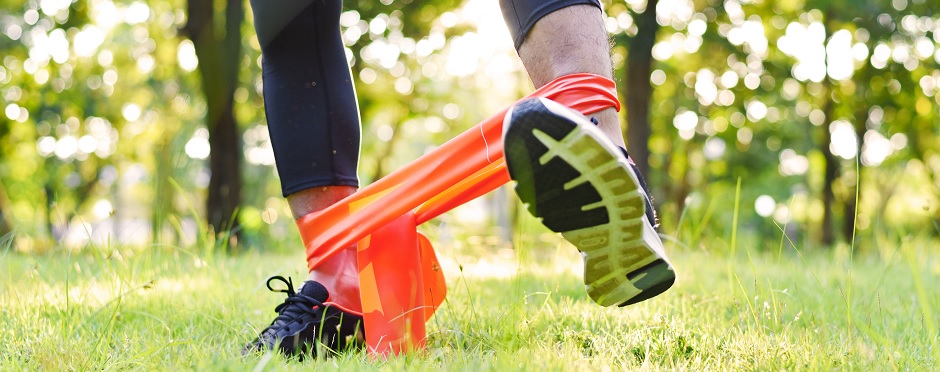
8 Exercises to Help IT Band Pain
12 CommentsThe IT band, or Illiotibial band, is connective tissue that runs along the lateral thigh from the hip to the outside of the tibia (shinbone), just below your knee. IT band pain occurs due to inflammation caused by friction between the IT band and thigh bone, often with repeated knee flexion and extension. This inflammation leads to pain on the outside of the knee, especially with repetitive use in running, walking, hiking and cycling.
Who Gets IT Band Pain?
Commonly, IT band pain occurs in runners and bikers due to the repetitive nature of the exercises. Typically, pain develops due to over training, weakness of the gluteus medius muscle or tightness of the hip flexors that cause abnormal stress on the IT band.1 Ramping up a running program too quickly or being too aggressive with mileage increase may lead to this injury. Additionally, this lateral knee pain can develop if you do not allow enough rest time between workouts or if you consistently skip stretching the lower body. Other risk factors include running on banked surfaces, running downhill, and running in worn out shoes.1
How To Resolve IT Band Pain
If you are experiencing IT band pain start with RICE—rest, ice, compression and elevation. After the pain calms down it is important to restore proper bio-mechanics with strengthening and stretching. Below are a few exercises that may support your recovery from IT band pain.
1. Foam Roll Your IT Band
Foam rolling can help increase tissue flexibility and increase blood flow to the area to aid in reducing inflammation.2
- Begin on your side with the foam roller just above your knee.
- Slowly move your body to roll the foam along the outside of your thigh toward your hip. This area can be sensitive, try to control how much pressure you apply by using your hands to offload weight.
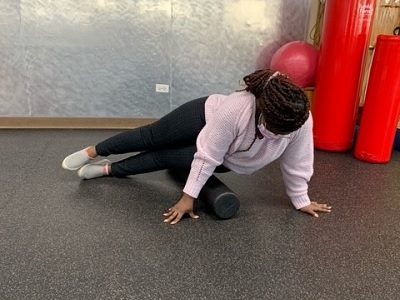
2. Hip Flexor Stretch
- Kneel with one foot in front.
- Shift your hips forward to feel a stretch in the front of the hip. Try to keep you core engaged to maximize your stretch.
- Hold for 20-30 seconds and repeat for 3 sets daily.
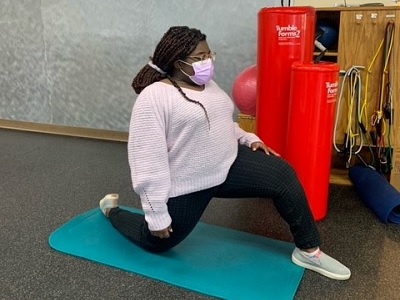
3. Clamshells
Clamshells are a great way to activate the gluteus medius muscle, which is important for hip stability, especially with running.
- Start in side lying with your knees bent to about 90 degrees.
- Lift the top knee as high as you can without letting your body roll backward.
- Lower the knee and repeat. To increase the difficulty, you can add a resistance band around your thighs.
- Complete 3 sets of 10 repetitions on each leg.
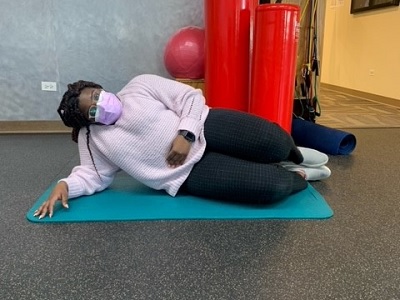
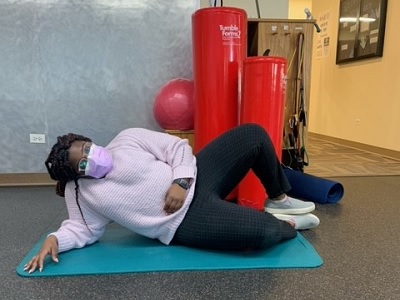
4. Side Lying Hip Abduction
Another great way to strengthen the gluteus medius muscle.
- Begin lying on your side with your top leg extended in line with your body.
- Lift your top leg, being careful to avoid letting the leg drift forward.
- Repeat 3 sets of 10 repetitions on each leg.
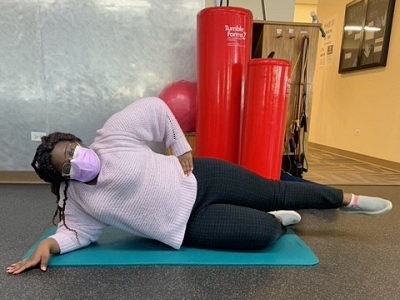
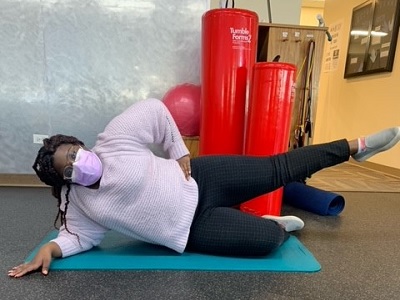
5. Figure-4 Bridge
- Begin lying on your back with your right knee bent and right foot flat on the floor.
- Cross your left ankle over your right knee to make a figure “4” with your legs.
- Squeeze your right gluteus (buttocks) muscles and lift your hips off the ground.
- Slowly lower your hips back to the ground.
- Repeat 3 sets of 10 repetitions on each leg.
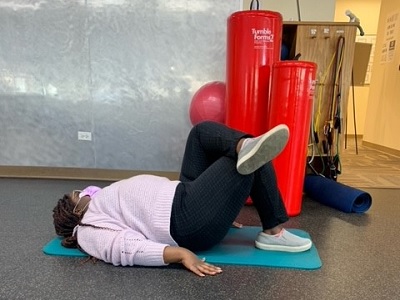
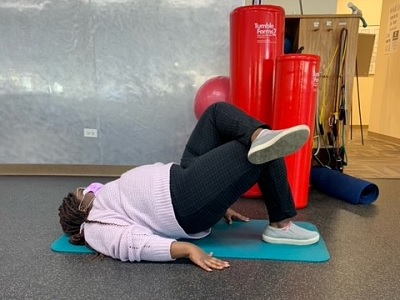
6. Glute Wall Press Isometric
In an isometric exercise, you activate a muscle and hold the contraction without moving your body. Wall sits and planks are common isometrics. This glute wall press isometric is a great way to isolate the gluteus medius muscles that stabilize your hips with walking, running and other activities.
- To begin, place a foam roller between the wall and your left thigh.
- With your left knee bent, push your left leg into the foam roller and hold for 5 seconds. You should feel your right side glute muscles working to stabilize. Complete for 2 sets of 10 repetitions holding for 5 seconds on each leg.
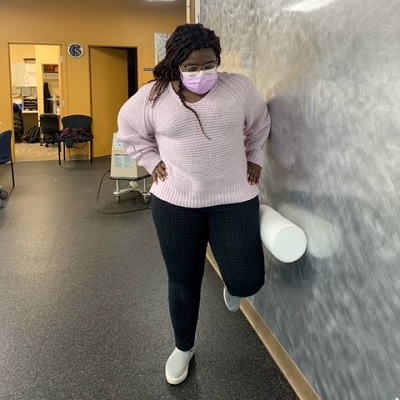
7. Lateral Band Walks
- Place a resistance band around your feet or ankles. (Band can also be placed just below your knees)
- Keeping your toes pointing forward, step sideways for about 10-15 steps.
- Repeat 3 times going to your left and 3 times going to your right.
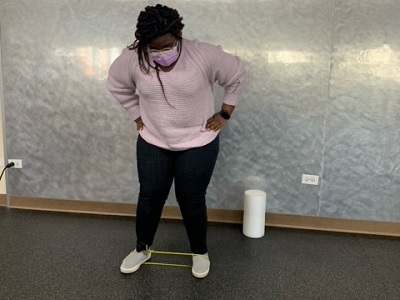
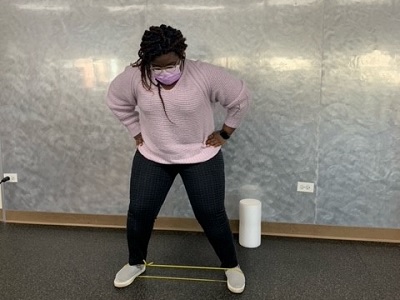
8. Side Planks
- Begin lying on your right side.
- Lift your hips off the ground, balancing on your right elbow and right foot. Focus on keeping the core and glutes engaged.
- Hold for 30 seconds and repeat 3 times on the right and left, daily.
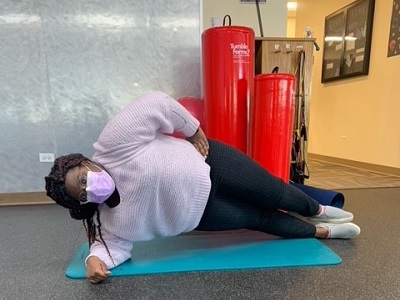
If after trying these exercises you do not see improvement and your pain is persisting, call an Athletico near you to schedule a free assessment. Free assessments are available in-clinic and virtually through our Telehealth platform.
The Athletico blog is an educational resource written by Athletico employees. Athletico bloggers are licensed professionals who abide by the code of ethics outlined by their respective professional associations. The content published in blog posts represents the opinion of the individual author based on their expertise and experience. The content provided in this blog is for informational purposes only, does not constitute medical advice and should not be relied on for making personal health decisions.
References:
1. Satio, Stephanie S. Orthopedic Rehabilitation Clinical Advisor, edited by Jacklyn Brechter, Mosby Inc, 2010, pp. 546–547.
2. Hotfiel , Thilo, et al. “Acute Effects of Lateral Thigh Foam Rolling on Arterial Tissue Perfusion Determined by Spectral Doppler a Power Doppler Ultrasound.” Journal of Strength and Condi-tioning Research, vol. 31, no. 4, Apr. 2017, pp. 893–900.

12 Comments
Francie Wallace
Hi,
Near the end of my COVID sickness I went outside to get some exercise, walked along a narrow path beside a sandy bottom creek, just after a heavy rain (bad idea!) In under a minute I slipped and fell about 2′ with all my weight on my right knee. So painful, but I was so happy to be in nature, in the water. Waited for the pain to subside, then stepped out and did some TaiChi and yoga (bad idea!) until I accepted my new condition. That was in early December.
Long story short, my knee is so much better with PT exercises RICE and time. But, I still live outside of best practices. My IT band, swelling in the hip is so painful when I walk.
I looked you up and realize, as I suspected, that my PT was not adequately addressing my problem.
I am grateful to have discovered your regimen. I’m starting today and not giving up. To act old, unhurried and slow, so at 73 I can act young again, that is my goal and my prayer.
Thank you!
Ann Clark
I am hopeful that your pain has subsided. Mine started out with little pain. But then i started the side steps with the bands. The next day i was in horrible pain and continue to have pain in my hip on and off. I have had this for over a month. I think I’m healing but its back with a fury the next day.
I’m wondering how long this typically lasts. I used to be a runner and when this happened, a few days of stretching would cure it. I too am 71 and unwilling to let this stop me. I play tennis doubles and today was excruciating. I’m icing now AGAIN CONSTANTLY!
How long might this take to heal?
Paulette Mason
I’ve been an athlete all my life and always moving. While I played tennis through the past couple of years and even during COVID, I had no issues. Then I started pickle ball in May of this yea and that was it, couldn’t move for weeks. Finally had it checked out and told it was IT Syndrome. My physical therapy sessions don’t seem to be addressing the issue at all. I’m absolutely in the dumps as I cannot not play some type of sport. At 73, I’m not giving up either. Just can’t believe that one day I was playing tennis and the next day, pickle ball did me in. Going to try these exercises as not doing these in PT at this time. Thank you for the encouragement, ladies!
Beo Benny
Great article Thanks!
Frank Oreste
This IT Band situation can be brutal if you don’t get after it. I took it for granted until about 1 year ago. I am a very active 70 year old (just turned). I play golf at a high level and I play often. I also was walking every day (3 mikes) and never did any stretching of any kind. Anyway, I had trouble with both my bands and went and received steroid shots. Within 2 weeks I was 100% back and still wasn’t smart enough to realize I needed to do stretches and exercises to maintain my bands.
Well, they both got bad again, especially the right band. I mean it was just a daily annoyance and I still refused to exercise or stretch. No particular reason either, just laziness and a lack of awareness. Well, one week ago the right band ripped. I could not tell you the pain I suffered but it lasted about 2 seconds max. The largest bruise on my right thigh that I have ever had, by far.
My advice is to pay attention to these IT BANDS. I am learning slowly just how important they are.
K A Shelby
I am so glad I found this site. All the comments make a person feel they are not alone. My massage therapist had me using a tennis ball in the hip socket (IT Band attach point). It has worked every time I have needed it. But as all the comments indicate that we are all aging (I just turned 75) we are supposed to be wiser. I’m not so sure about that! I have two acres, horses, live in the mountains, and am widowed. So work it is. My IT Band (left side) had been bothering down my leg. That was a new area. My massage therapist had worked on it a week or so ago. Felt better for a few days – in fact really good. As soon as I had outside work to do, and of course, tending to my love of riding, I over did the day. Sleeping at night was horrible, to say the least. Enough background. Your first exercise, roller on the floor, helped immediately! Now, if I can just take my time, and NOT to multiple sets every 5 min, I’m hoping that the way I feel right now will continue. Thank you so much for this site. I will be back!
Big T
After meniscus repair my IT band has become very swollen around my knee. Thank you for these exercises
Vipul
How many times a week I have to do this workout??
Bigi Ritter
I have always been extremely active with tennis, dancing, gym weights, walking. Started pickleball and played 7 days a week, walking 5-6 miles a day, gym work and dancing. YUP! Overuse injury of my IT band. It started as a pain during a pickleball match but I was unable to walk or put any weight on my right foot. Pain around the knee, behind the knee and up my right leg. Went to Dr who diagnosed IT band syndrome and referred me to PT. That therapist decided it was arthritis and, after 2 months, I was still in major pain. MRI confirmed IT band syndrome, patella chondromalacia… NO ARTHRITIS! I started with sports rehab (after wasting 2 months at PT) and after 2 weeks SO much improved! Many of these exercises are part of the game. I can only walk a mile before pain returns, but I can do THAT now! Hopes to return to pickleball in a few weeks and you BETCHA I will continue these exercises and stretches! BTW, 70 years old female. My doctor suggested injections and we shall see.
Jennifer Bray
Thankyou for these exercises, I especially like that your model doing the exercises looks like a normal person, so many advice sites have someone looking like they are about to win a body-building competition, which can put off we mere mortals! Please thank the lady who modelled for me!
JR
Echoing Jennifer’s comment above!! I also really appreciate seeing a woman of color doing these exercises. It makes me feel welcome and inspired to seek care for my health. Thank you!
George Malley
Got new material to work at thank you